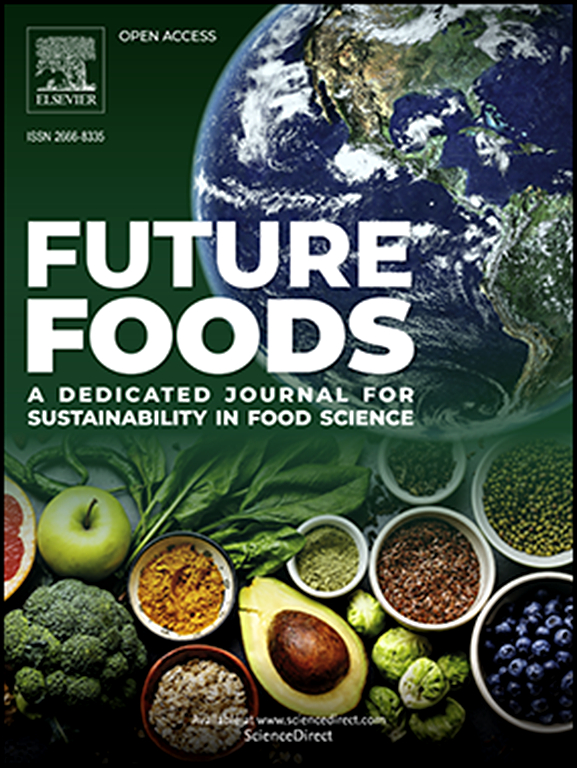Enhancing microalgal proteins for nutraceutical and functional food applications
IF 7.2
Q1 FOOD SCIENCE & TECHNOLOGY
引用次数: 0
Abstract
Despite their immense potential, microalgae are quite potential agents for sustainable, lucrative, easily produce, and vegan protein source, either due to high protein content in a few microalgal species or the high protein productivity. Compared to traditional plant-based proteins, the popularity is growing for microalgal protein products is because of their diversity, essential amino acids, less allergenicity, nutritious composition, functional properties, sustainability, and potential for bioactive compounds. Despite these advantages, some challenges linked to the production of microalgae protein, their scalability, and optimization of mass-multiplication techniques need to be studied. The literature to date lacks a comprehensive review that addresses the nutraceutical enhancement and optimization of protein yield in microalgae. This review aims to bridge this gap by dissecting the processes involved in the formation of microalgal protein hydrolysates, concentrates, and isolates. It explores methodologies for enhancing protein content, with a particular emphasis on the resultant nutraceutical improvements, including their bioactivities, functional properties in food systems, and broader industrial applications. This synthesis offers a critical perspective on how these processes can be harnessed to advance both scientific understanding and practical applications in the field.

增强微藻蛋白在营养保健和功能性食品中的应用
尽管微藻具有巨大的潜力,但由于其蛋白质含量高或蛋白质产量高,微藻是一种非常有潜力的可持续、有利可图、易于生产的纯素蛋白质来源。与传统的植物蛋白相比,微藻蛋白产品越来越受欢迎,因为它们具有多样性、必需氨基酸、较少的致敏性、营养成分、功能特性、可持续性和潜在的生物活性化合物。尽管有这些优势,但与微藻蛋白的生产、其可扩展性和大规模繁殖技术的优化有关的一些挑战需要研究。迄今为止的文献缺乏关于微藻营养增强和蛋白质产量优化的全面综述。这篇综述旨在通过剖析微藻蛋白水解物、浓缩物和分离物的形成过程来弥合这一差距。它探讨了提高蛋白质含量的方法,特别强调了由此产生的营养改善,包括它们的生物活性、食品系统中的功能特性和更广泛的工业应用。这种综合为如何利用这些过程来促进该领域的科学理解和实际应用提供了一个关键的视角。
本文章由计算机程序翻译,如有差异,请以英文原文为准。
求助全文
约1分钟内获得全文
求助全文
来源期刊

Future Foods
Agricultural and Biological Sciences-Food Science
CiteScore
8.60
自引率
0.00%
发文量
97
审稿时长
15 weeks
期刊介绍:
Future Foods is a specialized journal that is dedicated to tackling the challenges posed by climate change and the need for sustainability in the realm of food production. The journal recognizes the imperative to transform current food manufacturing and consumption practices to meet the dietary needs of a burgeoning global population while simultaneously curbing environmental degradation.
The mission of Future Foods is to disseminate research that aligns with the goal of fostering the development of innovative technologies and alternative food sources to establish more sustainable food systems. The journal is committed to publishing high-quality, peer-reviewed articles that contribute to the advancement of sustainable food practices.
Abstracting and indexing:
Scopus
Directory of Open Access Journals (DOAJ)
Emerging Sources Citation Index (ESCI)
SCImago Journal Rank (SJR)
SNIP
 求助内容:
求助内容: 应助结果提醒方式:
应助结果提醒方式:


